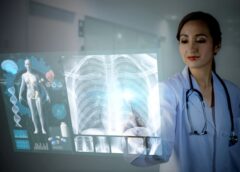Researchers are finding extensive tissue damage from COVID-19, a systemic illness that damages cells and organs throughout the body.
More than 828,000 deaths have been attributed to COVID-19 worldwide. More than 24 million cases have been reported to date. Survivors are suffering from many long-term effects of the illness. There is still much to learn about how COVID-19 affects the human body, and the virus clearly impacts people with varying degrees of severity. While many patients have mild symptoms, some cases are more severe than others. Some patients need to be hospitalized in critical condition with respiratory failure, blood vessel complications, or multiple organ dysfunction. And yet, the variations are many.
While most people eagerly anticipate the end of the pandemic, researchers are trying to figure out why COVID-19 seems to affect people in so many different ways, what damage the illness does, and why long-COVID symptoms are so persistent.
RELATED: Why do colleges need vaccine mandates?
Tissue Damage from Covid-19
Scientists are now uncovering the ways in which COVID-19 damages cells and organs throughout the body. Evidence is pointing toward it being a systemic disease, rather than a respiratory one.
“Clinical observations suggest that COVID-19 is a systemic disease, meaning that it affects the entire body rather than just a single organ such as the lungs,” explains Stefanie Deinhardt-Emmer, Resident in Medical Microbiology, Jena University Hospital, Jena, Germany.
Can COVID-19 Cause Parkinson’s Disease Later?
“But we don’t currently have a clear understanding of disease development in humans and other organisms, due to the lack of appropriate experimental models. Investigating the viral distribution of SARS-CoV-2 within the human body and how this relates to tissue damage would help us address this gap.”
To do this, Deinhardt-Emmer and colleagues studied 11 autopsy cases of patients with COVID-19. They performed the autopsies shortly after the patients died, before the tissues and viral ribonucleic acid (RNA – a molecule similar to DNA) began to decay.
Their analysis revealed high viral loads in most of the patients’ lungs, which had caused significant damage to those organs. Using an imaging technique called transmission electron microscopy, the team also saw intact viral particles in the lung tissue, indicating extensive tissue damage from COVID-19.
RELATED: STOPPING BACTERIA FROM STEALING OUR IRON
“Interestingly, we also detected SARS-CoV-2 RNA throughout various other tissues and organs unrelated to the lungs that did not cause visible tissue damage,” says Daniel Wittschieber, Senior Forensic Pathologist at Jena University Hospital. The researchers say that this distribution of viral RNA throughout the body supports the idea that our immune system is unable to respond adequately to the virus’ presence in the blood.
“We show that COVID-19 is a systemic disease as determined by the presence of virus RNA, and yet unrelated to tissue damage outside the lungs,” says Bettina Löffler, Director of the Institute for Medical Microbiology, Jena University Hospital. “To our knowledge, this study is the only one to date that has measured viral loads in a wide variety of organs and tissues, with more than 60 samples studied per patient.”
These research findings were published in the journal eLife.
Reference
Deinhardt-Emmer, S., Wittschieber, D., Sanft, J., Kleemann, S., Elschner, S., Haupt, K. F., . . . Mall, G. (2020). Early postmortem mapping of SARS-CoV-2 RNA in patients with COVID-19 and correlation to tissue damage. ELife. doi:10.1101/2020.07.01.182550
More Covid-19 Pandemic Coverage
LONG-TERM EFFECTS OF COVID-19 INFECTION
EDITORIAL: COVID-19 DARK WEB MARKETPLACE
The information contained in this article is for informational purposes only and is not intended as health or medical advice. Always consult a physician or other qualified health provider regarding any questions you may have about a medical condition or health objectives.

